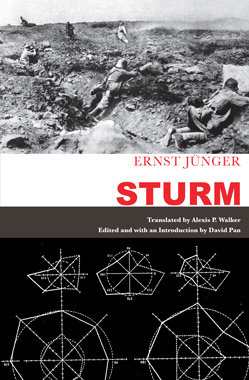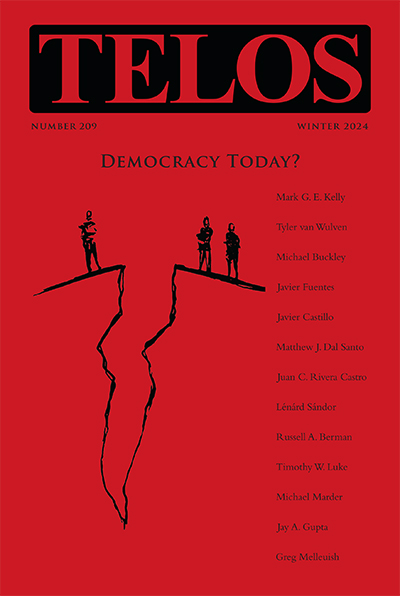Telos Press Publishing is pleased to announce that Ernst Jünger’s Sturm is now available for purchase. Order your copy today in our online store.
Translated by Alexis P. Walker
With an Introduction by David Pan
Set in 1916 in the days before the Somme offensive, Ernst Jünger’s Sturm provides a vivid portrait of the front-line experiences of four German infantry officers and their company. A highly cultivated man and an acute observer of his era, the eponymous Lieutenant Sturm entertains his friends during lulls in the action with readings from his literary sketches. The text’s forays into philosophical and social commentary address many of the themes of Jünger’s early work, such as the nature of war, death, heroism, the phenomenon of Rausch, and mass society.
Originally published in installments in the Hannoverscher Kurier in 1923, Sturm fell into obscurity until 1960, when it was re-discovered and subsequently re-published by Hans Peter des Coudres, a scholar of Jünger’s work. This translation—the first to be published in English—brings to the English-speaking world a work of literature of interest not only to students of Jünger’s work and of World War I, but to any reader in search of a powerful story of war and its effects on the lives of the men who endure it.
Praise for Ernst Jünger’s Sturm
“The rediscovery of Ernst Jünger’s Sturm, abandoned by its author after its first publication in 1923, significantly alters our understanding of Jünger’s place in modern European literature. The literary and aesthetic moments, frequently seen as secondary in Jünger’s early work, turn out to be constitutive from the very beginning. While the plot deals with the experience of war in 1916, Sturm‘s ultimate concern is the possibility of radical modern art under conditions of extreme violence.”
—Peter Uwe Hohendahl, Jacob Gould Schurman Professor Emeritus of German Studies and Comparative Literature, Cornell University
“This translation of Sturm fills a long missing gap in the German war literature of the 1920s available to English readers. The translation by Alexis Walker is vibrant and precise while also reflecting the nuances and tone of the original German text. David Pan’s introduction sets the stage with a masterful overview of the context in which Sturm was written and pays particular attention to the debates since then on the aestheticization of the war experience.”
—Elliot Neaman, Professor of History, University of San Francisco
“An unblinking account of a culture in twilight, this novella recasts central themes of Ernst Jünger’s chronicles of the Great War: the unrelenting test of human perdurance under new technologies of annihilation; the naturalist’s precise aesthetic of life teeming amid martial insanity; and, a new note, the harrowing free fall of civilian life into erotic aimlessness and inebriated despair, for which only art serves for an antidote. In Alexis Walker’s carefully wrought translation, Sturm will be a welcome surprise to Jünger’s veteran readers, and an ideal introduction for those who are curious to know more than his name.”
—Thomas Nevin, author of Ernst Jünger and Germany: Into the Abyss, 1914–1945
“Had Stephen Crane’s Henry Fleming been born in 1895 Germany, his story might very well have read like the eponymous protagonist’s of Ernst Jünger’s Sturm. In a fascinating novella in turn meditative and wrenchingly physical, Jünger stages a drama of one man’s ideas about himself, as told through a narration conflicted about its own subject.”
—Alex Vernon, James and Emily Bost Odyssey Professor of English, Hendrix College
“Sturm is a subtle novella about an intellectual in the trenches who sees the age of industrial-scale war as deeply dehumanizing, yet recognizes that this war has given him a sense of identity, and of community with others, that no peacetime experience could match. . . . Jünger is a remarkable writer. In this novella he comes across as a romantic with a loathing of modernity, especially as characterized by the overbearing state. The book is grim, and deeply pessimistic—but exceptionally interesting, and well worth reading.”
—George Simmers, Great War Fiction blog
About the Author
Ernst Jünger (1895–1998) was one of the most complex and controversial writers of twentieth-century Germany. Born in Heidelberg, he fought in the German Army during World War I, an experience that he would later recount in his gripping war memoir, Storm of Steel. Though Jünger would serve as a German officer during World War II, his 1939 novel On the Marble Cliffs daringly advanced an allegorical critique of Hitler’s regime. Over the course of his long literary career, Jünger would author more than fifty books, some of which are now available in English translation from Telos Press, including On Pain, The Adventurous Heart, The Forest Passage, and Eumeswil.




